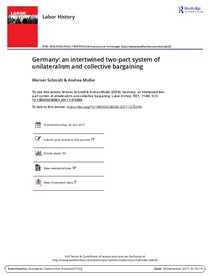Germany: an intertwined two-part system of unilateralism and collective bargaining

Schmidt, Werner ; Müller, Andrea
2018
59
1
February
71-86
labour relations ; public sector ; collective bargaining
Labour relations
https://doi.org/10.1080/0023656X.2017.1375596
English
Bibliogr.
"Public sector industrial relations in Germany consist of two parts. On the one hand, wages and working conditions for civil servants are unilaterally determined by law, and on the other, there is a completely developed industrial relations system for non-civil servants (employees) working in the sector. Remarkably, although they have no right to take industrial action, civil servants are not in a worse situation than employees. In view of a simple concept of industrial relations where employers and workers are in complementary labour market roles, this seems difficult to explain. Indeed, public sector industrial relations are more complex. The article suggests that bargaining in the public sector is less an economic procedure than a dispute over the political, societal and statutory recognition of public services and an adequate participation of employees. Being aware of this special character of public sector industrial relations, the United Services Trade Union (Ver.di) tries to back strikes by organising societal support, whereas the German Federation of Civil Servants (DBB) operates more by lobbying in the political sphere and by recourse to the constitution. In spite of a general decline in collective bargaining and trade union density, and long years of austerity, both types of industrial relations are relatively stable."
Digital
The ETUI is co-funded by the European Union. Views and opinions expressed are however those of the author(s) only and do not necessarily reflect those of the European Union or the ETUI.